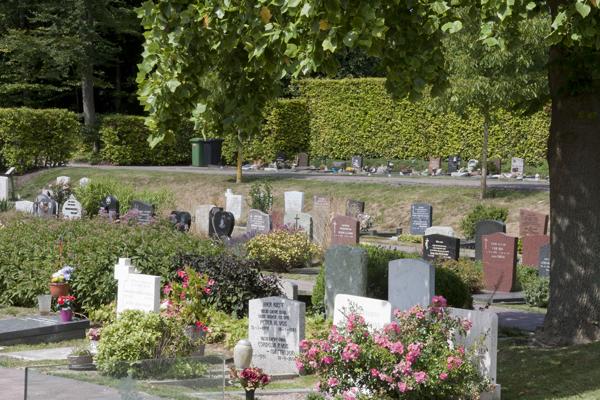Types of graves
At the Binnenweg cemetery in Zoetermeer, only private graves for adults are available. At the Hoflaan cemetery in Zoetermeer, in addition to general graves and private graves, you will also find urn graves, an urn wall, an ash scattering bowl and a scattering field.
Private graves
A private grave is a grave where the rightful owner determines who is buried in the grave. The rightful owner is always 1 person, this can be family but does not have to be. More information about the rightful owner: www.uitvaart.nl | Who is the rightful owner with regard to burial rights .
The exclusive right for a private grave can be obtained for 10, 20, 30 or 40 years, for 2 or 3 persons. After this period, the rightful owner can extend the burial right by 5, 10, 15 or 20 years. The surviving relatives can choose the preferred location. For a first burial, one can choose from a number of graves. For an additional burial, the location has already been determined by the previous burial. The surviving relatives can also plant the grave or place a stone or other memorial there. For a memorial, you must apply for a permit via the form that the rightful owner receives. The municipality takes care of the general maintenance of the cemetery grounds. The rightful owner takes care of the maintenance of the grave: the memorial and the existing grave planting.
General graves
A communal grave is a grave where multiple, often unknown, persons are buried above each other. These graves are issued in order and there is no choice with whom the deceased is buried in the grave. Communal graves are cheaper than private graves and have a right of use of 10 years. You cannot extend a communal grave for adults. After these 10 years, we will ask you what should happen to the last remains of the deceased. You can then choose between reburial, cremation or transfer to the collective grave (this is an anonymous part of the cemetery. There is no longer any possibility of commemoration there).
Difference between private grave and public grave
What is the concrete difference between a private and a public grave?
- In the case of a private grave, the rightful owner has a say. In the case of a public grave, the municipality has a say.
- In a public grave the stone must be smaller than in a private grave because people from different families are buried in the grave.
Children's graves
At the Hoflaan cemetery in Zoetermeer there are both private children's graves and general ones. The right for a private children's grave can be obtained for 10, 20, 30 or 40 years and can then be extended by 5, 10, 15 or 20 years. You can also opt for a general children's grave. These have a right of use of 10 years. You can then extend by 5 or 10 years. In contrast to the general graves for adults, it is possible to extend the term of general children's graves.
The possibilities on the Binnenweg and Hoflaan differ from each other. At the Binnenweg cemetery there are existing (old) general children's graves. The right of use is/can be extended by 5 or 10 years. There are no private children's graves, that possibility is not offered.
Urn and ashes
The Meerbloemhof crematorium in Zoetermeer is located on the Hoflaan cemetery and is owned by Monuta. After a cremation, you can place the urn in the urn wall (the Columbarium), in an urn grave, in or on a private grave or scatter the ashes in the ash scattering bowl or on the scattering field. After scattering the ashes, a memorial plaque can be placed on one of the memorial columns (these are located at the scattering field on the cemetery and at the ash scattering bowl in the urn garden).

